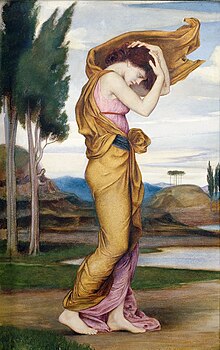Deianira
| Deianira | |
|---|---|
Calydonian Princess | |
| Member of the Royal House of Calydon | |
 Deianira by Evelyn De Morgan | |
| Other names | Deïanira, Deianeira, Deyanire, or Dejanira |
| Abode | Calydon |
| Personal information | |
| Parents | Althaea (mythology) and Oeneus or Dexamenus |
| Siblings | Meleager, Toxeus, Clymenus, Periphas, Agelaus, Thyreus, Gorge, Eurymede, Mothone, Perimede, Melanippe, and Tydeus (if Oeneus was her father) Eurypylus, Theronice and Theraephone (if Dexamenus was her father) |
| Consort | Heracles |
| Offspring | |
Deianira, Deïanira, or Deianeira[1] (/ˌdi.əˈnirə/;[2] Ancient Greek: Δηϊάνειρα, Dēiáneira, or Δῃάνειρα, Dēáneira, [dɛːiáneːra]), also known as Dejanira,[3] was a Calydonian princess in Greek mythology whose name translated as "man-destroyer"[4] or "destroyer of her husband".[5][6] She was the wife of Heracles and, in late Classical accounts, his unwitting murderer, killing him with the poisoned Shirt of Nessus. She is the main character in Sophocles' play Women of Trachis.
Family[]
Deianira was the daughter of Althaea and her husband Oeneus[7] (whose name means "wine-man"), the king of Calydon (after the wine-god gave the king the vine to cultivate), and the half-sister of Meleager. Her other siblings were Toxeus, Clymenus, Periphas, Agelaus (or Ageleus), Thyreus (or Phereus or Pheres), Gorge, Eurymede and Melanippe.[8][9]
In some accounts, Deianira was the daughter of King Dexamenus of Olenus and thus, sister to Eurypylus, Theronice and Theraephon. Others called this daughter of Dexamenus as Mnesimache[10] or Hippolyte.[11]
Deianira was the mother of Hyllus, Glenus, Onites, Ctesippus, and Macaria, who saved the Athenians from defeat by Eurystheus.
Mythology and Literature[]
Marriage[]
In Sophocles' account of Deianira's marriage, she was courted by the river god Achelous but saved from having to marry him by Heracles, who defeated Achelous in a wrestling contest for her hand in marriage.[12]
In another version of the tale where she was described as the daughter of Dexamenus, Heracles raped her and promised to come back and marry her. While he was away, the centaur Eurytion appeared and demanded her as his wife. Her father being afraid, agreed but Heracles returning before the marriage had slayed the centaur and claimed his bride.[13]

Deianira was associated with combat, and was described as someone who "drove a chariot and practiced the art of war."[14]
Death of Heracles[]
The central story about Deianira concerns the Shirt of Nessus. A wild centaur named Nessus attempted to kidnap or rape Deianira as he was ferrying her across the river Euenos, but she was rescued by Heracles, who shot the centaur with a poisoned arrow. As he lay dying, Nessus persuaded Deianira to take a sample of his blood, telling her that a potion of it mixed with olive oil would ensure that Heracles would never again be unfaithful.
Deianira believed his words and kept a little of the potion by her. Heracles fathered illegitimate children all across Greece and then fell in love with Iole. When Deianira thus feared that her husband would leave her forever, she smeared some of the blood on Heracles' famous lionskin shirt. Heracles' servant, Lichas, brought him the shirt and he put it on. The centaur's toxic blood burned Heracles terribly, and eventually, he threw himself into a funeral pyre. In despair, Deianira committed suicide by hanging herself or with a sword.
| Preceded by Omphale |
Wives of Heracles | Succeeded by Hebe |
Middle Age tradition[]
She is remembered in De Mulieribus Claris, a collection of biographies of historical and mythological women by the Florentine author Giovanni Boccaccio, composed in 1361–62. It is notable as the first collection devoted exclusively to biographies of women in Western literature.[15]
Calydonian family tree[]
References[]
- ^ Chisholm, Hugh, ed. (1911). . Encyclopædia Britannica. 13 (11th ed.). Cambridge University Press. p. 346.
- ^ Wells, John C. (2009). "Deianira". Longman Pronunciation Dictionary. London: Pearson Longman. ISBN 978-1-4058-8118-0.
- ^ Baynes, T. S., ed. (1878). . Encyclopædia Britannica. 7 (9th ed.). New York: Charles Scribner's Sons. p. 37.
- ^ P. Walcot, "Greek Attitudes towards Women: The Mythological Evidence" Rome, 2nd Series, 31:1:43 (April 1984); at JSTOR
- ^ Koine. Y. (editor in chief), Kenkyusha's New English-Japanese Dictionary, 5th ed., Kenkyusha, 1980, p.551.
- ^ Antoninus Liberalis. Metamorphoses, Notes and Commentary on Meleagrides sv. Deianira, p.111
- ^ Hammond, N. G. L.; Scullard, H. H., eds. (1970). The Oxford Classical Dictionary (2d ed.). Oxford [Eng.]: Clarendon Press. p. 319. ISBN 0198691173.
- ^ Antoninus Liberalis, Metamorphoses 2
- ^ Hesiod, Ehoiai fr. 98 as cited in Berlin Papyri, No. 9777
- ^ Pseudo-Apollodorus, Bibliotheca 2.5.5.
- ^ Diodorus Siculus. Library of History, 4.33.1.
- ^ Wohl, Victoria (2010). "A Tragic Case of Poisoning: Intention Between Tragedy and the Law". Transactions of the American Philological Association. 140 (1): 53. doi:10.1353/apa.0.0046. S2CID 159697583.
- ^ Hyginus. Fabulae, 31
- ^ Bibliotecha I.8.1
- ^ Boccaccio, Giovanni (2003). Famous Women. I Tatti Renaissance Library. 1. Translated by Virginia Brown. Cambridge, MA: Harvard University Press. p. xi. ISBN 0-674-01130-9.
Sources[]
Primary sources[]
- 8Hesiod, Catalogue of Women fr. 2 5
- Ovid, Heroides 9
- Ovid, Metamorphoses 9.101-238
Secondary sources[]
- Harry Thurston Peck, Harper's Dictionary of Classical Antiquities, 1898
- Graves, Robert, The Greek Myths, 1955, 142.ff, 142.2,3,5
- Aetolian mythology
- Family of Calyce
- Women of Heracles
- Greek feminine given names
- Demigods
- Suicides in Greek mythology
- Metamorphoses characters
- Children of Dionysus
